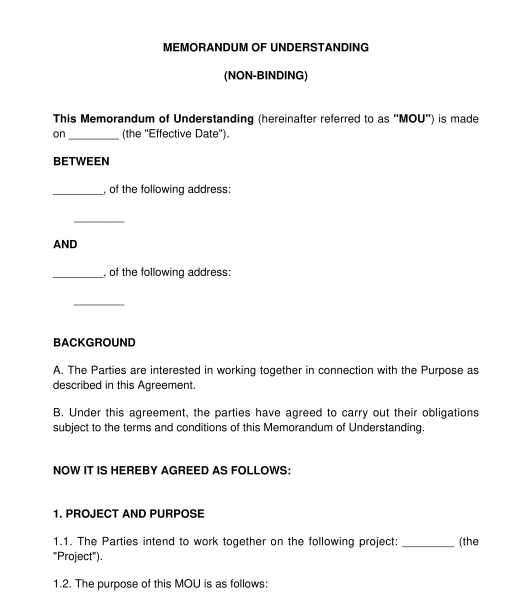 28/11/2025
28/11/2025

Answer a few questions and your document is created automatically.

Your document is ready! You will receive it in Word and PDF formats. You will be able to modify it.




Rating: 4.4 - 56 votes
Download a basic template (FREE) Create a customized documentA Memorandum of Understanding, also known as MOU, is a document describing the purpose of an intended collaboration and the roles of the parties involved. This is the first stage of the formation of a formal contract. Parties generally use MOUs to outline their intentions and initial understanding without committing to legally enforceable obligations.
This document can be used at a contract negotiation stage between parties. This is the stage where parties are deliberating on the fundamental terms of the project. This is also the stage where parties either do not imply a legal commitment or where the terms of the MOU are still subject to a final contract. It can also be used at the final stages of negotiation to create a binding obligation on parties.
MOU is a versatile document that can be used to outline terms of a mutual understanding. For example, MOUs can be used in business partnerships, when two parties intend to collaborate on a joint venture. It can also be used in academic or research collaborations, when two parties intend to collaborate on research projects. Additionally, it can be used by governments and international organizations to outline the terms of their cooperation on various issues without making any legally binding commitments.
Generally, the MOU is not legally binding. However, an MOU may be binding if the parties intend for the MOU to be binding and the MOU contains all the elements of a valid contract.
A contract is legally binding or enforceable when parties to the contract are obligated by law to comply with the terms of the contract. This is because contracts typically fulfill certain legal requirements such as offer, acceptance, consideration, mutual intent to be bound, and legality of purpose, making them enforceable in a court of law.
MOUs are usually drafted during the early stages (negotiation stage) of an agreement, when parties are still in the process of negotiating terms and details. At this stage, there may be uncertainties or incomplete information regarding the final agreement. Hence, parties use MOUs to outline their intentions and initial understanding without committing to legally enforceable obligations. Hence, MOUs are generally not legally binding.
On the other hand, the MOU can be legally binding if the parties have a completed bargain that has been settled by all the parties to the MOU. It will also be legally binding if there are all the elements of the contract, such as offer, acceptance, consideration, and intention to create a legal relationship, as described below:
Overall, an MOU can be either legally binding or not depending on how the MOU is drafted and whether all the elements of a contract are present in the MOU.
An MOU is typically not a legally binding contract. It is drafted during the contract negotiation stage to outline their mutual understanding regarding an intended project or transaction. While the MOU is not binding at the negotiation stage, it helps to set clear expectations and outlines the roles of each party.
After the negotiation stage, parties often draft a final contract in the form of a Partnership Agreement, Joint Venture Agreement, Collaboration Agreement, or other contract to formalize their commitments. In other words, while the MOU is not usually binding, partnership, joint venture, and collaboration agreements are legally binding contracts.
No, it is not mandatory to have an MOU. However, it is advisable for parties to have it during the negotiation stage of an intended collaboration. The MOU is important as it specifies the duties and responsibilities of all the parties involved.
An MOU should contain the following:
Other provisions of an MOU include:
Parties to an MOU can be any individual, company or registered organization involved in an intended collaboration or agreement.
Generally, persons who are below the age of 18 years cannot validly enter a binding contract, including an MOU.
Additionally, organizations and companies without the requisite authorization from the board of directors cannot enter an MOU.
The duration of an MOU depends on the nature of the intended collaboration between the parties.
The MOU can be set for a fixed duration or for an indefinite period, which is set to terminate when the parties execute a final contract.
The MOU should be signed by all the parties in multiple original copies. The MOU can be signed in person or electronically.
If either of the parties is a company or a registered organization, the MOU should be signed by a director or officer of the company or organization.
After signing, each party should keep one signed copy for their record.
No, it is not necessary to notarize an MOU.
No, MOUs are not registered with any authority or agency in Nigeria.
Yes, the MOU needs to be witnessed to be valid.
After the parties have signed, the document must be witnessed by at least one person. The witness is required to hand fill in their names, addresses, and occupations and also sign the document.
No costs are associated with the finalization of an MOU.
There is no specific law regulating MOUs. However, the general laws of contract apply to an MOU.
You fill out a form. The document is created before your eyes as you respond to the questions.
At the end, you receive it in Word and PDF formats. You can modify it and reuse it.
Memorandum of Understanding - FREE - sample template
Country: Nigeria